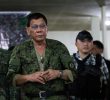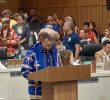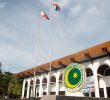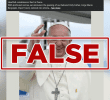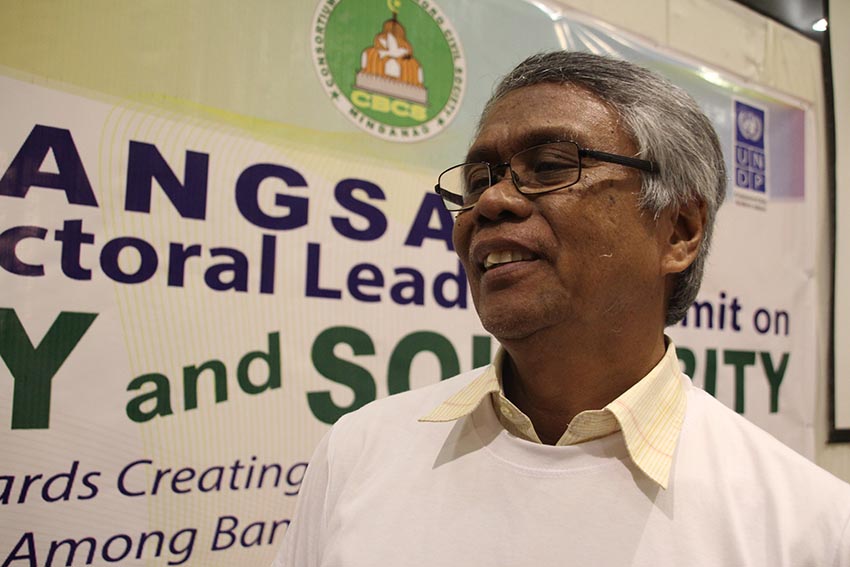
HOPEFUL. Consortium of Bangsamoro Civil Societies Chairman Guiamel Alim says he is hopeful that their call to unify the Moro National Liberation Front and the Moro Islamic Liberation Front will bear fruit at the conclusion of the three day Bangsamoro Multi-sectoral Leaders’ Summit on Unity and Solidarity held at the Royal Mandaya Hotel in Davao City on Thursday, Dec. 8. (Paulo C. Rizal/davaotoday.com)
DAVAO CITY, Philippines – An alliance of Bangsamoro civil society groups called for the unification of Moro National Liberation Front and the Moro Islamic Liberation Front, two separate revolutionary groups negotiating peace with the Philippine government.
“We call on the MNLF at MILF to unify their proposals for the organic law, which will become a new law for the new autonomous government,” said Guiamel Alim, chairman of the Consortium of Bangsamoro Civil Society at the conclusion of the 3-day summit held at the Royal Mandaya Hotel here from Dec. 6 to 8.
Around 125 participants, representing their individual organizations joined the summit, titled “Bangsamoro Multi-Sectoral Leaders’ Summit on Unity and Solidarity.”
Alim said the summit was the culmination of previous assemblies and consultation held in the municipal and provincial levels in order to determine the urgent issues of the Bangsamoro communities.
In a copy of the 3-page document of the Declaration statement furnished to DavaoToday, the participants of the summit appealed to both groups “to coordinate their efforts and find common grounds in drafting a law that would ensure the implementation of the peace agreements and strengthen Bangsamoro self-governance in fulfillment of the aspiration for self-determination.”
The group also asked MNLF chairman Nur Misuari and MILF chairman Al Haj Murad Ebrahim to honor the agreement signed on May 18, 2010 in Dushanbe, Republic of Tajikistan which states that, among others, “unity is indispensable to the success of the Bangsamoro struggle and that there are no basic differences between the Fronts as both are seeking to achieve peace, justice, and a fair solution to the problems of the Bangsamoro people.”
Alim said the response of the representatives of both groups were “positive.” Alim said he hoped that both groups would talk and unite their proposals before passing their drafts to congress.
Both the MILF and the MNLF are currently working on separate peace agreements with the government, with the MILF and the Muslimin Sema faction of the MNLF creating a new Bangsamoro Transition Commission, and the Misuari-led MNLF faction forming its own peace panel.
Alim also called on the government to hasten the Bangsamoro peace process.
“Until now, they have not named the people who will write the new enabling law; those who will comprise the new Bangsamoro Transition Commission. And the deadline of submission will be next year of July. We think the drafting of the new enabling law should be starting as early as now,” Alim said.
On Nov. 7, 2016, President Rodrigo Duterte signed an executive order which created a new and expanded BTC. Duterte’s EO increased the number of BTC members from 15 to 21, where 10 members will come from the MILF and 10 will be from the government. Irene Santiago, head of the government peace panel said the expanded BTC aimed to include representatives from the Indigenous Peoples, local government units, and the Moro National Liberation Group, among others.
The armed conflict and subsequent peace talks between the Philippine government and the two rival groups has spanned seven presidents, starting with the Tripoli agreement signed by Misuari and the government of President Ferdinand Marcos in 1976, to the Basic Bangsamoro Law, the result of the peace agreements with the MILF and the peace agreements with President Benigno Aquino III in 2014.
The BBL failed to pass and was shelved by the 16th congress, in part because of the Mamasapano clash that killed 44 members of the Philippine National Police Special Action Forces, 18 MILF combatants, and the death of Jemaah Islamiyah affiliated bomb maker Zulkifi Abdhir also known as Marwan. Members of the Senate also questioned the constitutionality of the bill. (davaotoday.com)

